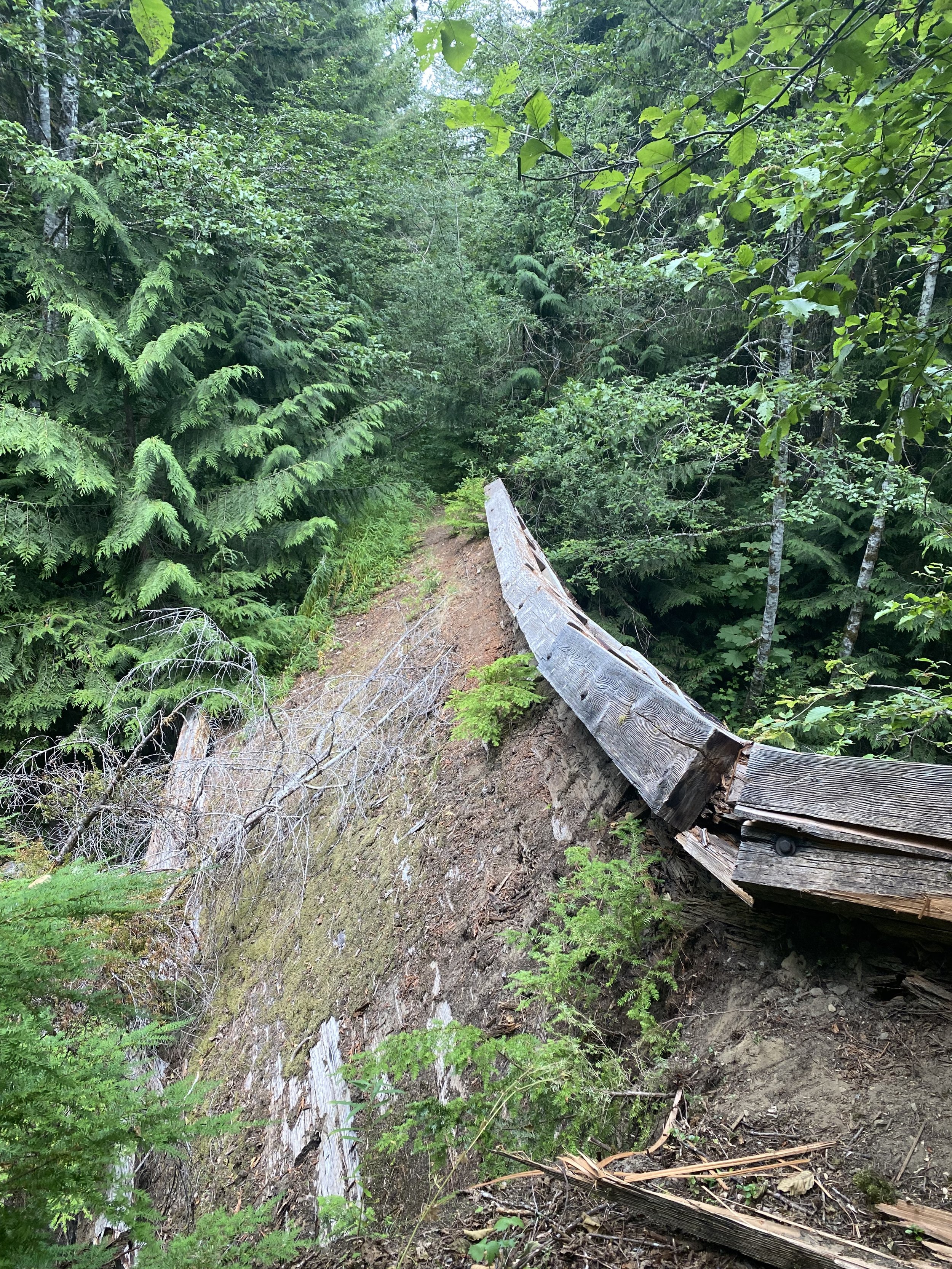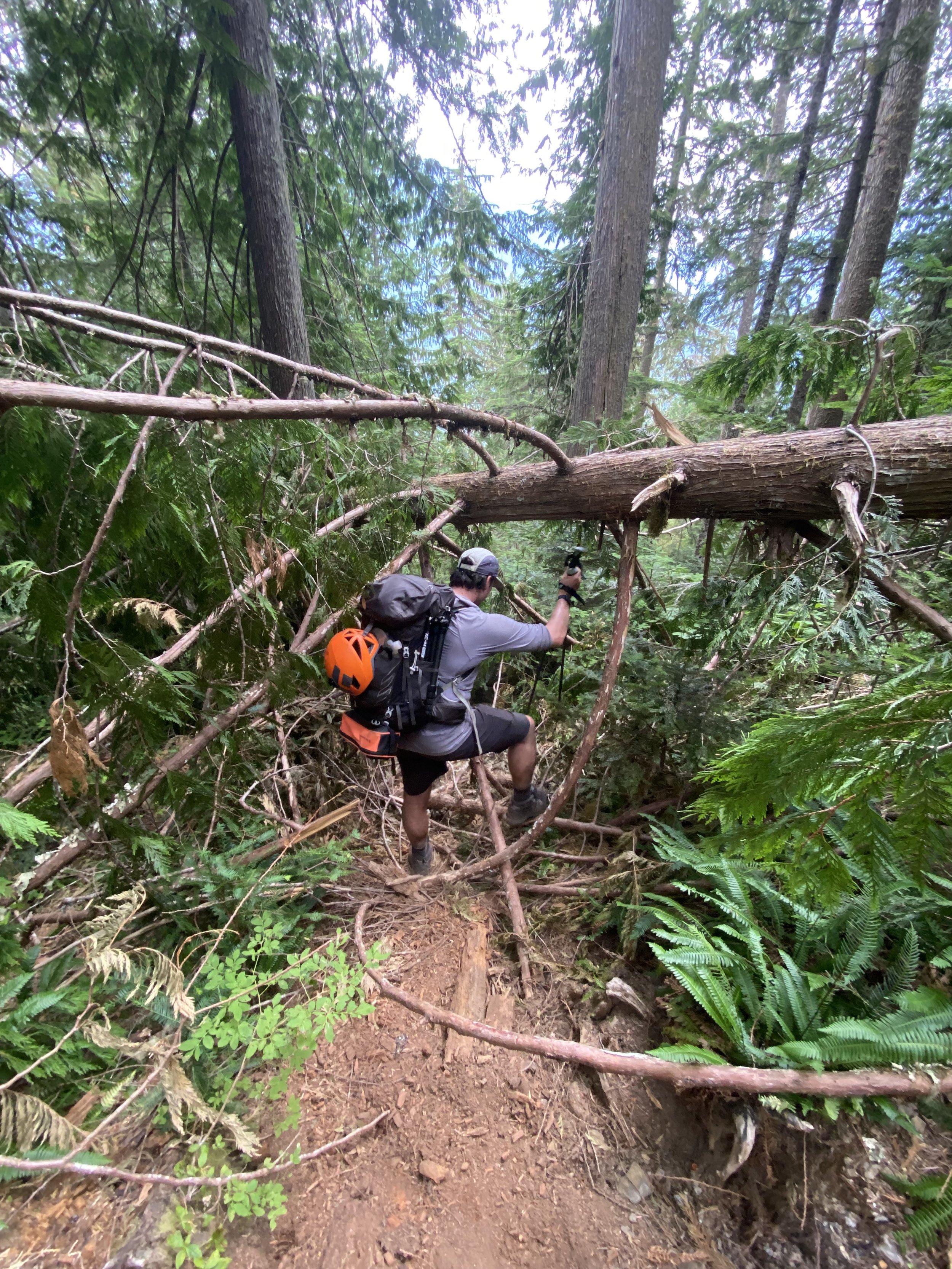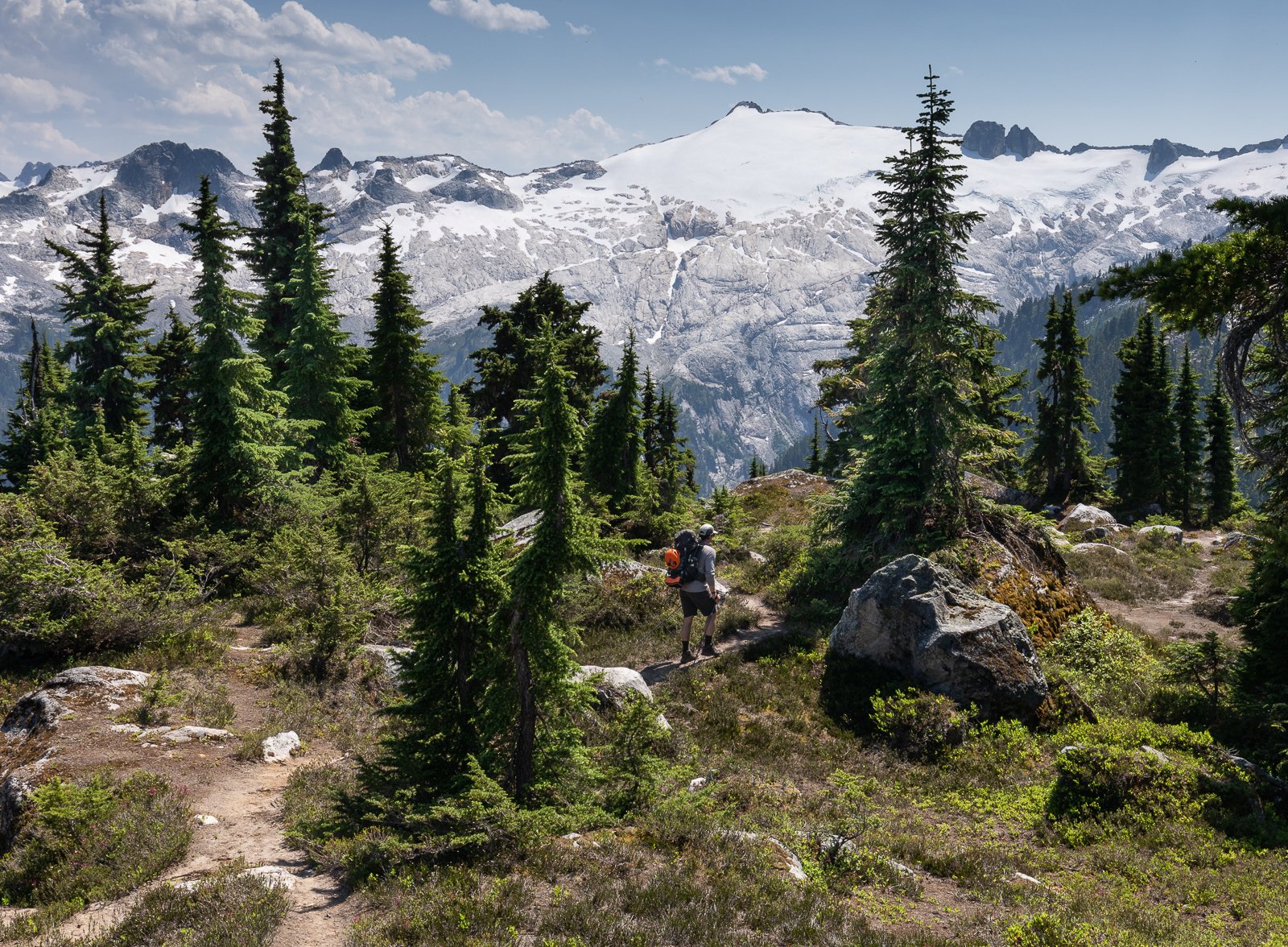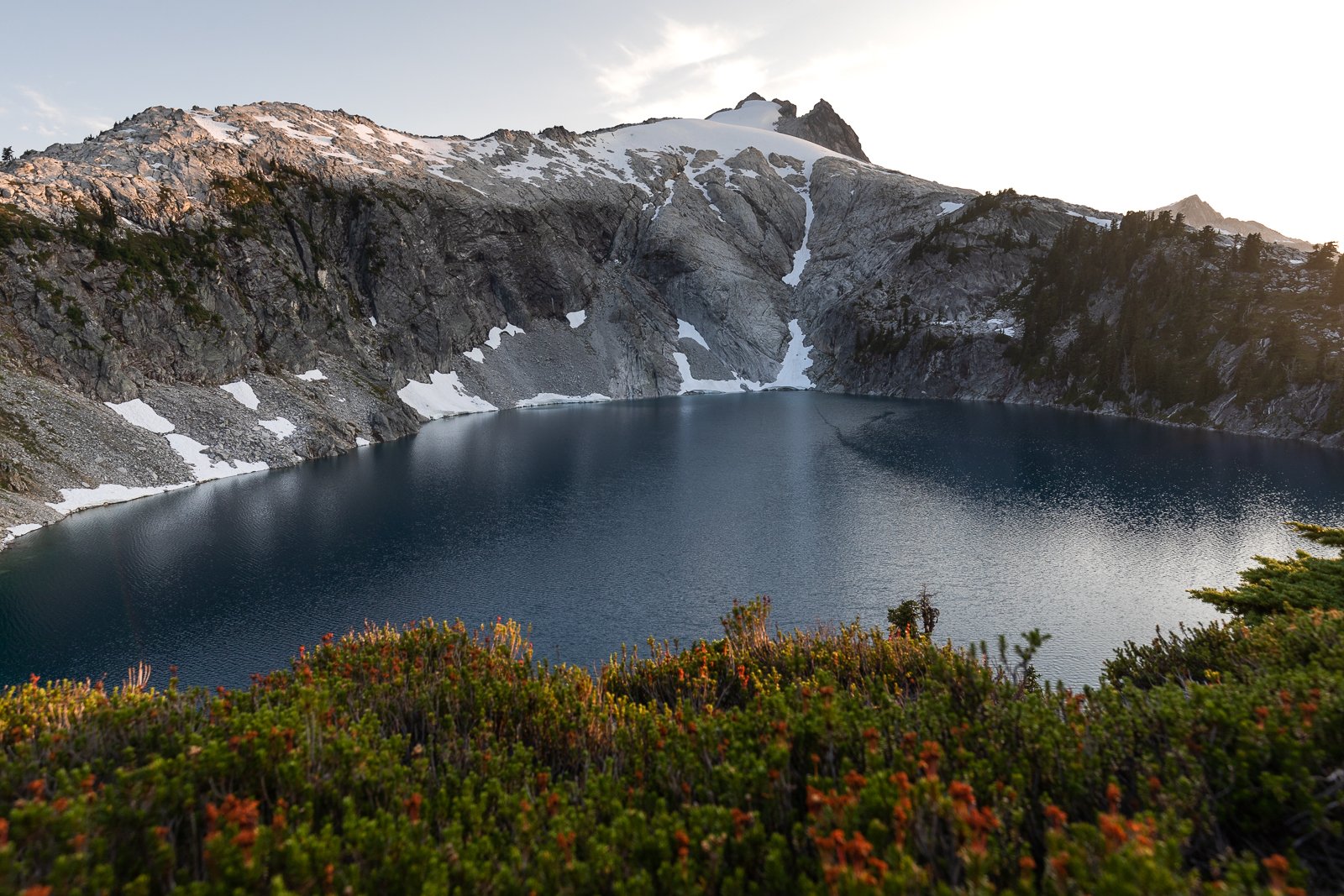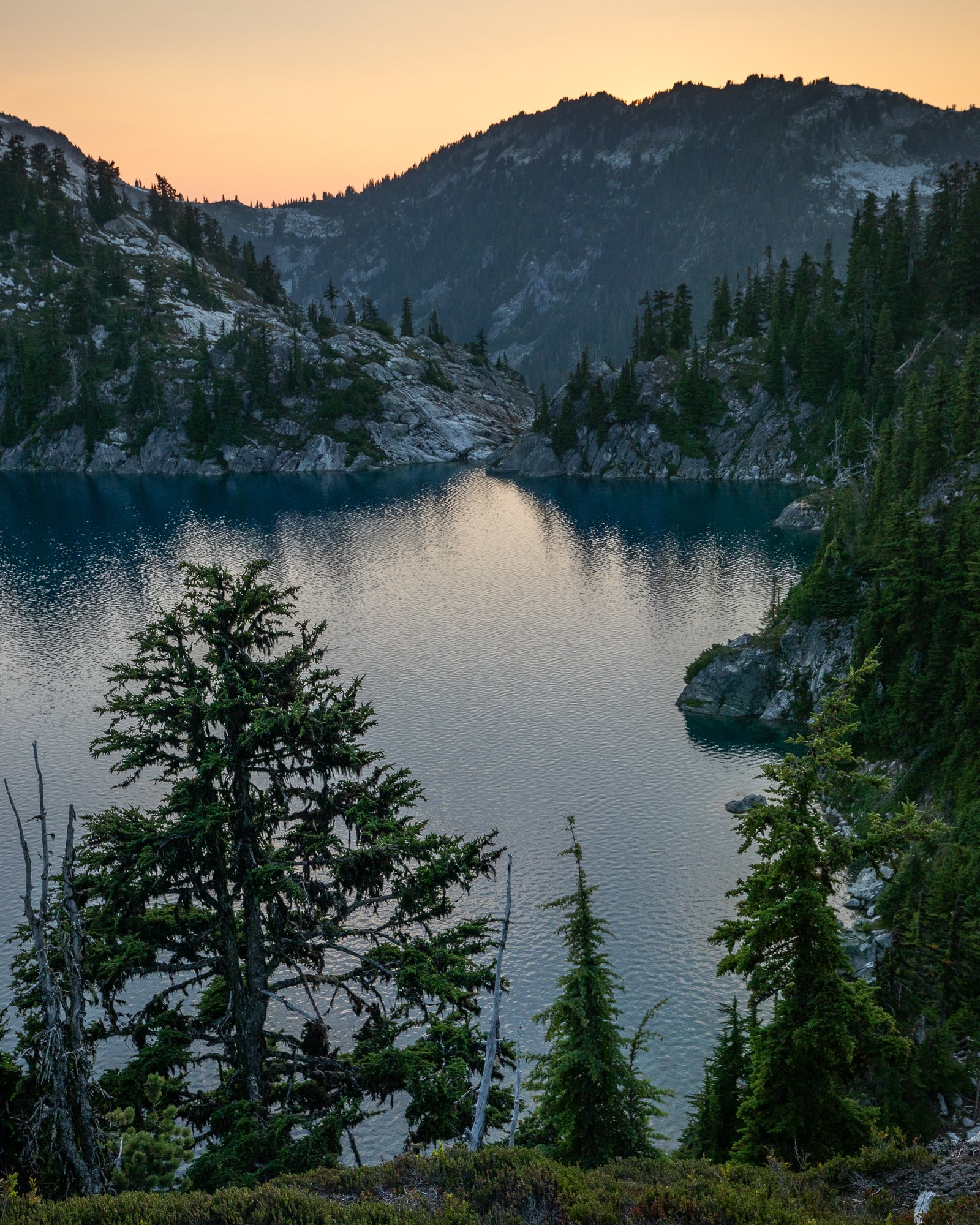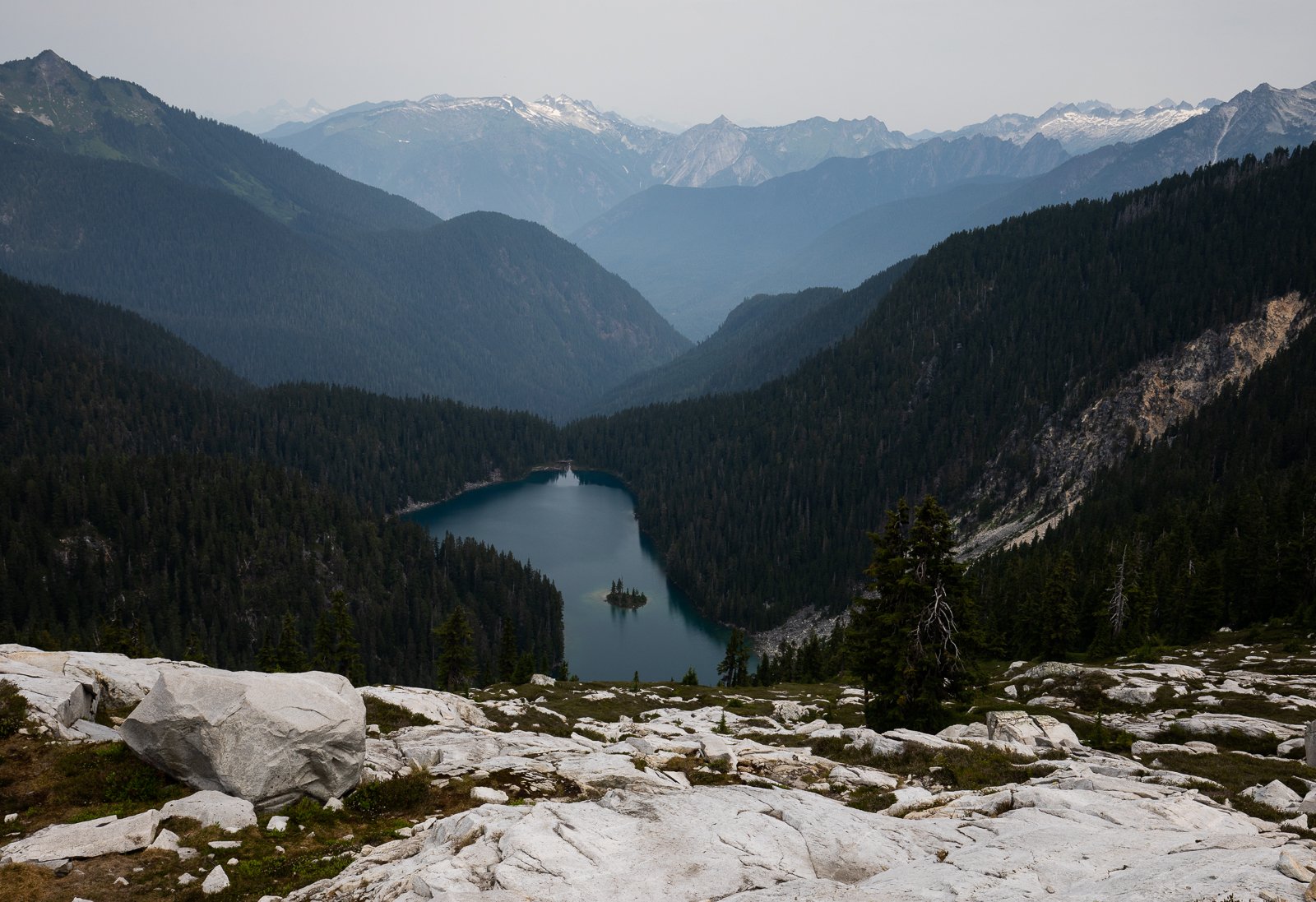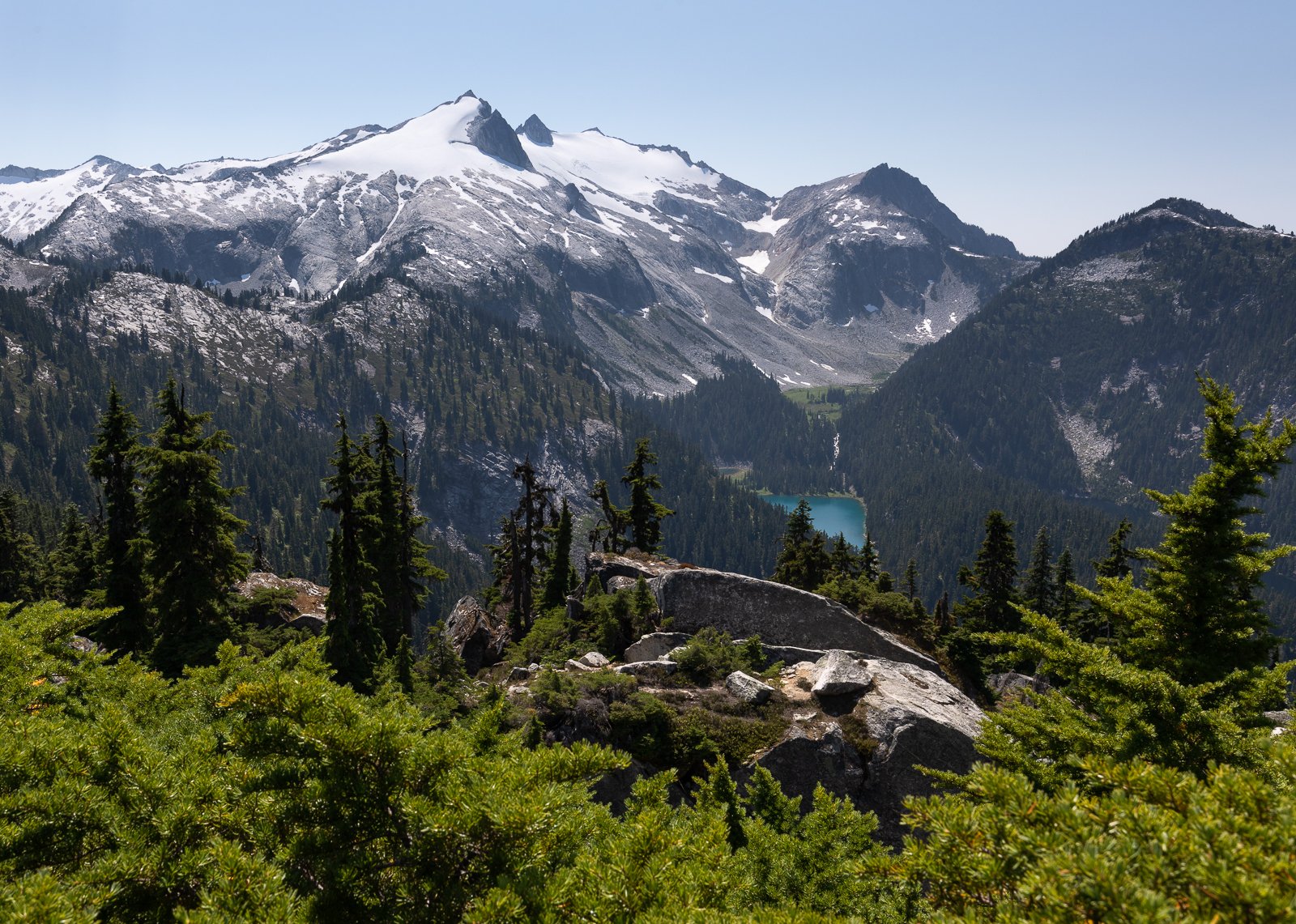An Encounter with Icy Royalty in the North Cascades
Dates hiked: 7/30/21-7/31/21
Total mileage: 16 miles
Total elevation gain: 6,000’
Red tape: No permits required, this is outside North Cascades National Park, but follow all LNT principles and only camp in the already established camp sites
The name Snowking Mountain elicits thoughts of icy royalty—a peak draped in a velvet robe of snow in an area that is so difficult to reach it feels as if it were guarded. Snowking resides in the Glacier Peak Wilderness, just on the outskirts of North Cascades National Park and while it may not be guarded in the literal sense, the route requires battling the terrain nearly every step of the way. In fact, one of the reasons this blog post has taken me nearly half a year to write is because of how shaken our experience on the trail left me.
Alex and I started the hike as we start nearly every trip in the mountains: early. A heat wave was forecast to sweep through the area and we didn’t want to spend too much time hiking in the height of the midday heat. We arrived to a trailhead that was empty save for one car whose occupants appeared to have had quite the forest party the evening prior. Empty beer bottles and playing cards were strewn about. They likely weren’t expecting early morning visitors given how infrequently visited this pocket of the North Cascades is.
On a map it appears as if there is an easily defined trail to follow to the base of Snowking Mountain, but in reality the first couple miles of “trail” is an old logger’s road that has long since been reclaimed by the forest. The road may once have been wide enough for trucks to pass through, but today it barely constitutes as a trail at all. Brush towers overhead and branches grab at your feet in what feels like a dark, leafy corridor. We continued on this path until the road petered out and the trail turned into the forest and up onto a ridge on a relentless grade. Climber’s trails are some of the most notoriously steep trails I’ve ever hiked and this one was no exception. I was regularly forced to use my hands to hoist myself up and over roots and rocks. The trail gained over 2000’ in just one mile and while the progress was slow, every time I turned around it was evident we were gaining elevation. Both Alex and I regularly sipped water, trying to stay hydrated in the increasing heat. Despite being under a shady canopy, the heat and exertion were already taking its toll on us. We continued upward.
Finally, we broke out of the forest into a small meadow. The ground was soft and water-laden under our feet. Mosquitos proliferated in the boggy environment and gathered around us in thick swarms. My water was quickly running out, but I didn’t want to fill up my bottle with scummy mosquito pond water. I also didn’t want to linger too long and subject myself to the blood-thirsty mosquitos.
Another peculiarity of this hike was the obvious lack of other people. Very rarely do Alex and I go for so many hours without seeing even one other hiker, but there wasn’t a trace of anyone else on the trail. We’re always self-reliant but there is something comforting—even if it’s just a psychological fallacy—about knowing other humans are nearby, just in case.
The trail continued to climb and my water bottle continued to empty. I took the last sip just as we popped out of the trees and into the full exposure of the sun. We were still a couple miles and a few thousand vertical feet below camp. Alex had only a few sips of water left in his bladder.
I’ve been thirsty before, but never has my thirst scared me. I may have gotten too comfortable traveling on snow during our winter and spring trips into the mountains, where water is abundant and rehydration is just a Jetboil away. Not this time. The heat was zapping my energy and my clothes were soaked through with sweat. As we hiked, it felt as if my legs weren’t quite listening to me anymore, I got sloppy and fumbled over my feet. I grew foggy. I could hear myself talking to Alex but it felt as if I were hearing someone else speak—my voice sounded so far away. My tongue felt swollen and leaden in my mouth and finally, I felt terrified.
“If we find any mosquito pond scum, I’m going to drink it," I declared to Alex. I was so desperate for water I was willing to drink anything to quench my thirst. My exhaustion was overwhelming, but I knew I couldn’t stop; I knew that if I stopped hiking to take a break in the shade I might not have the energy to return to my feet. We figured it would be at least another hour to reach our camp near Cyclone Lake, where we could drink our fill. I looked around at the mountains surrounding us, all capped in snow—capped in water. It seemed like a cruel trick. The peaks may as well have been on the surface of the moon.
One foot in front of the other we carried on, the scenes blurred together, until suddenly we happened upon it. A melting snow patch right in front of us. It had the faintest trickle of water flowing from it, but that was enough for me. I threw down my pack down and pulled out our filter. The water dripped slowly into the filter, but eventually a liter of refreshing cold water was ready. And then another, and another. Alex and I relished in the cold, invigorating water and tried not to think about what could have happened if we hadn’t happened upon the melting snow. We waited and refilled our bottles with another liter each, enough to get us to camp.
When we reached the lake we wasted no time in heading straight to the shore to filter yet more water. Once rehydrated, we took a look at the surrounding landscape, the area we hoped to call home for two nights. The basin was empty, not a single other camper or tent in sight. We set off to look for a camp spot and it wasn’t long until we found an established site on an elevated bench overlooking the lake with a picture-perfect view of Snowking.
As we set up the tent, inflating sleeping pads and unfurling sleeping bags, the bugs descended upon us. Between the exhaustion and the biting mosquitos, we couldn’t stand to be in the elements any longer. We crawled into the tent and tried to nap as soon as everything was situated. The tent felt like an oven and there wasn’t even a breath of a breeze to offer reprieve from the heat. Sleep was far away, but it was a relief to be fully hydrated and out of the sun.
As the day carried the sun toward the horizon, the temperature finally felt bearable. I made dinner and we sat on the rocks near camp, taking in the scene that had cost us so much to see. The deep blue Cyclone Lake nestled beneath Snowking is an astonishing sight, easily one of the more beautiful views I’ve experienced in Washington. I was lost in my thoughts, staring at the majestic mountain, when suddenly a high-pitched whirring sounded through the silence and a tiny Cessna buzzed into view. The plane banked above us, ostensibly offering its occupants a closeup of Snowking. I recognized the flight path, it had to be Snowking Aviation on a sunset flightsee tour, the very same tour Alex and I took in October 2020. I remember looking down on this landscape from that plane, determined to see it from the ground one day. Had I known the intensity of the hike and physical and mental cost of the adventure, I may have been content with the view from 8,000’. Alex and I watched the plane and joked about how nice it would be to get picked up and whisked away. Instead, oblivious to our existence, the plane banked one last time and flew back toward the airport in Concrete, disappearing into a pinprick in the sky. Silence engulfed us once again.
We turned in early, still drained from the harrowing day.
A disappointing view greeted us in the morning. Smoke swept in overnight, filling the lake basin with a haze and choking the surrounding mountains. We had initially planned to spend two nights at the lake, using the second day to climb to Snowking’s summit, but between the previous day’s effort, dehydration, and the smoke, it wasn’t a difficult decision to head back to the trailhead a day early.
I felt wholly defeated as we packed our gear, filtered water, refilled our bottles, and began the long journey back to the car. For so long I had looked forward to this hike and it had felt cursed from the start.
We wended our way down the trail, up and over ridges, and headed into the forest. Alex and I chatted as we rounded a bend. We suddenly heard the distinct sound of claws scratching bark. We stopped in our tracks and looked at each other. Alex offered, “maybe it’s squirrels fighting in a tree.”
Movement caught my eye and I looked toward a tree in front of us. My heart rate spiked as I watched two tiny creatures scurry up the tree. Black bear cubs. They were impossibly adorable and impossibly fast, scaling to the top of the tree in mere seconds. They were scared of us, and we were scared of them. The implications of the baby bears set us on high alert; we knew Mama Bear may be in any of the surrounding bushes, intently watching us. If we continued to follow the trail we would end up directly under the tree the cubs were occupying. Not wanting Mama Bear to think we were heading for her cubs, we decided to give the tree a wide berth and find an alternate route.
The terrain was rugged and we quickly discovered we were on a narrow ridge with steep drop offs on either side, so giving a wide berth was a logistical challenge. We worked our way around a rocky outcropping and found ourselves on a steep, grassy slope above a precipitous cliff. I clung to nearby roots and tree branches as a sort of veggie hand-line as we gingerly made our way across the obstacle-ridden terrain. Eventually the route deposited us back on the trail, the bear tree behind us and still no sign of Mama Bear. Rather than be comforted by the sow’s lack of appearance, I was even more on edge. She could still be anywhere.
I was coursing with adrenaline the entire hike back. Alex and I talked loudly and interspersed our conversations with AY-YOs to make our presence well known. Still, every sound felt threatening. Every rustle of leaves in the faint wind, every bird landing on a bough, every squirrel scampering through the underbrush.
A few hours later we made it back to the road and began the final push back to the car. The brush still towered over us on all sides, there could be bears anywhere, I thought.
I didn’t let my guard down until the beep-beep of the car unlocking sounded through the forest. When we finally threw our packs into the car and shut the door behind us, relief enveloped me. I’m always happy to eventually reach the car after a long hike, but never before has the feeling been so pronounced.
For weeks after returning home I dwelled on the experience—fixated on it. I know that things can go wrong in a matter of minutes in the mountains, but never has that fact stood out in such stark relief for me. I was shaken to the core. Did we almost die of dehydration? How close were we to falling off the cliff trying to avoid baby bears? How did we end up in those situations? What could we have done differently? The questions played on repeat in my mind. We’ve learned to bring much more water than we previously thought necessary on summer hikes. Even in the lush, green forests of Washington, water is not a guarantee—especially not during a record-breaking heat wave. I’ve accepted that I wouldn’t have done anything differently in the bear situation. Following the trail and making a beeline for the tree could have caused Mama Bear to view us as a threat if she were watching.
I feel grateful that our experience ended as a relatively benign learning opportunity instead of the alternative. It was a humbling reminder that the mountains don’t care what happens to us, and it is up to us as outdoor recreationists to not get complacent or let our guards down. This experience may have caused an abrupt end to our summer/fall hiking season, but as the saying goes, “the mountains will always be there!”


